I Love Someone Rare & Beautiful - Raising a Daughter with CHILD Syndrome
Lifestyle
|
Feb 11, 2019
|
11 MIN READ
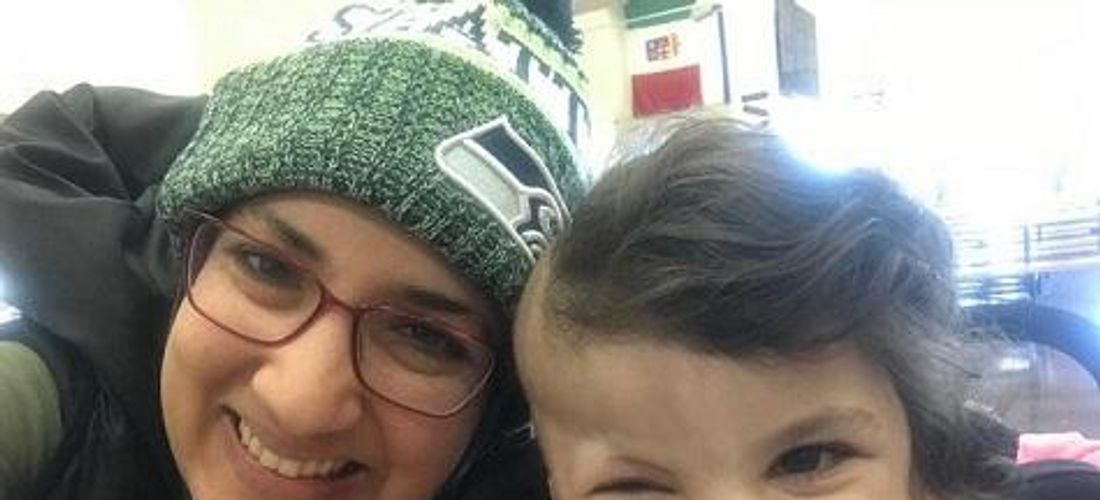
Sometimes you know a person for years, but you don’t really know them. And, when you take the time to really get to know a friend, it can be the most profound, impactful thing. I have been friends with Samia Mubarak and her beautiful family for several years now. Recently, I had the opportunity to interview Samia about her life as a parent of a special needs child. It was eye- and soul-opening, to say the least.
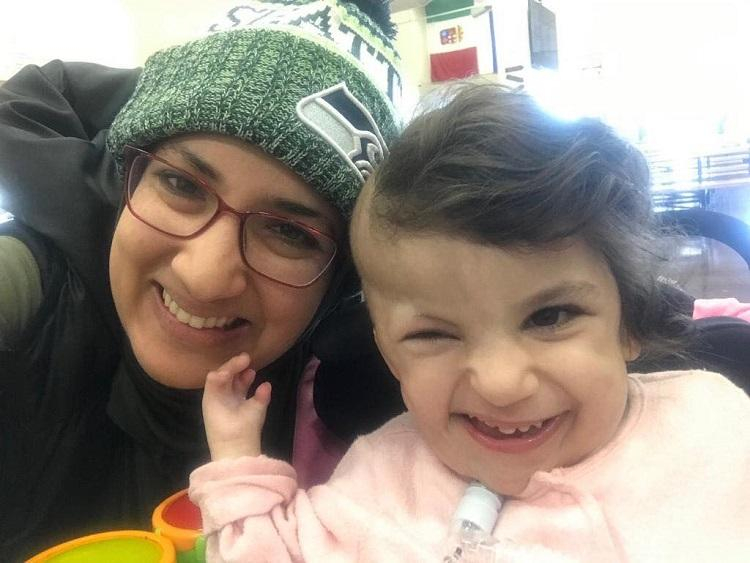
She opened up my eyes to some of the realities of families who have children with special needs, showing me a glimpse of her daily life behind her beautiful smile and enthusiastic persona that our community sees. Learning what her day entails was so revealing, helping me to realize how much we all take for granted.
Samia is a mother to two beautiful girls, Tasneem, five, and Maryam, three. She lives in North Carolina with her husband, Ossama, and worked as a recruiter for five years. After moving to North Carolina, she finished memorizing the entire Quran. However, it was the birth of her children, especially her second, that was one of her most life-changing experiences. I talked to Samia about her daughter’s diagnosis, what her daily routine is like, how she maintains her mental health and her preparations for World Rare Disease Day on February 23.
Tell me about your pregnancy and Maryam’s birth, as well as adjusting to life with a newborn who has a rare genetic condition.
We found out there was an issue at 20 weeks during [an] ultrasound where the brain looked different. After talking to specialists and doing ultrasounds once a month, the doctors found something new each time. They told us that her right side was immobile, she didn’t have a right kidney … they kept finding new things and prepared us for the worst. The doctors didn’t have a diagnosis at the time even though they ran several tests but couldn’t figure out what was going on. They connected Ossama and I to palliative care as an option after delivery.
When it came time for the delivery, I was making du’a that whatever happens, may Allah (S) help us accept it. I had a normal delivery, and Maryam was born at 4 lb 13 oz. Her right side was significantly smaller than her left, but she was able to move it. Health-wise she was fine but had to stay in the NICU for one month so doctors could monitor her health and development.
The doctors found out what she had five days after birth. They called it CHILD Syndrome. Our geneticist told us that she's been practicing for 30 years and has never seen a case like Maryam’s before.
Alhamdulillah after the month at NICU Maryam was able to come home. At the time, her main issue was that the skin on the right side of her body was very dry, patchy and scaly. We used many temporary solutions with moisturizing, but nothing really helped. Maryam’s surgeon reached out to a friend and found a publication by a doctor in Argentina who had done research on a girl with CHILD and was able to invent a cream that healed the girl’s cracked skin.
This was a big leap of hope for us, and we were very thankful when our pharmacist was able to recreate the cream for Maryam using the doctor’s recipe. The cream worked because it is made out of cholesterol, which is something that is missing in people who have CHILD syndrome.
This cream was also able to help Stephanie Jallen, who is a professional skier in the Paralympics and has CHILD Syndrome. We got in touch with her [when] she was 20 years old. [She had] never heard of that cream before and was suffering a lot from her skin condition. It’s amazing to see how at such a young age, Maryam impacted Stephanie so much.
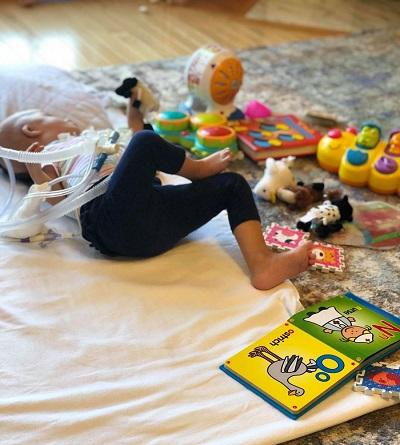
Maryam got a lot of physical therapy for her right side as well as aggressive speech therapy to help her with swallowing and communication. When she was six months old, her right lung collapsed. Her health had declined so much that the doctors told us to choose between putting her on a ventilator or take her to hospice. I prayed a lot of istikharah. As a mom you want to do your best, you don’t want to give up so easily.
[The doctors advised me that] having a tracheostomy will help her get better as she grows older and stronger. When I saw hope, I went with that option. Within weeks she was getting better. There was a major shift for our family; it was physically strenuous - like having a mini hospital at home. Ossama and I had to learn [how to be] nurses for Maryam at home. Now Maryam is on a trach ventilator and G-J tube.
Maryam brings into perspective the blessings we have. I am able to connect more with people with special needs now. Especially when I see them in the grocery store or out and about, I know the struggle they and their family go through, so I feel more empathy.
For a while I felt alone; I had little access to mothers with special needs. I connected with our genetic counselor, and she helped me get in touch with moms who have children with rare and undiagnosed syndromes. We created a group called “Rare and Undiagnosed Network of Charlotte.” We’ve done a lot of social events like coffee dates, educational seminars, and World Rare Disease Day will be our first public event on February 23.
For Maryam’s birthdays we have also done community walks at a local park, where we invite anyone who would like to come out and support Maryam while rocking a t-shirt that reads “I love someone rare & beautiful” on the front, and “CHILD Syndrome - Team Maryam” on the back. It’s been a great way for us to connect with our friends and local community. It’s also been a great opportunity for her therapists and doctors to come out and talk a little bit about their interactions with Maryam.
What is CHILD Syndrome?
Congenital Hemidysplasia with Ichthyosis and Limb Defects (CHILD) Syndrome is a rare genetic condition that affects only 63 people in the world. It is generally characterized by large patches of dry and scaly skin that is red in color and inflamed, as well as some limb underdevelopment, or in some cases, absence of limbs.
People diagnosed with CHILD Syndrome also have under developments in organs such as the brain, heart, lungs and kidneys. Its main cause is a mutation in the NSDHL gene, which is responsible for the production of an enzyme that makes cholesterol. Due to its X-linked dominant inheritance nature, CHILD syndrome is almost always found in females.
Take me through a day in the life of Samia.
Maryam and I have to be home in the mornings because that's when she has her medication routine. She gets several types of therapies at home. She also gets music therapy, which is Maryam’s favorite. She’s able to sit up on her own in her chair, and it really stimulates her brain.
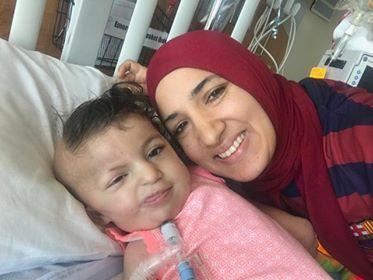
Sometimes I have nursing care, which is when I can get errands done. When I don’t have a nurse, I have to take Maryam with me, which can take a long time to leave the house - I have to brave it up. I get her emergency bag ready and her oxygen supplies. It can take as long as 30 minutes to load the car. I always have to have extras of everything, like battery packs and chargers for her equipment. Getting her in the car is a struggle, I have to carry the 40 pound ventilator on one shoulder, Maryam on the other shoulder, and her bag of feeds with one of my fingers.
Maryam gets excited and loves outings. She has to have a suction bag next to her because she doesn’t know how to cough things out, and if the mucus stays in her lungs she can develop pneumonia. So, I have to make frequent stops on the side of the road if I don’t have anyone else in the car to help me. I don’t take the highway for that reason and always take local and back roads. I stop anywhere from three to four times during a 20-30 minute car ride.
When Tasneem is with me, she helps out a lot. She puts Maryam’s circuit and feeds. Doctor appointments can take three to four hours. I try to book all of her appointments together so I don’t have to go out for several trips. Maryam gets just as excited at the end of our outing to be back home in her happy place, and by that time I’m exhausted just from one outing.
I don’t have time to take on the typical or traditional mother and wife role, so keeping up with the house and dinner needs a lot of involvement from my husband and other family members and friends who’d like to step in.
I prioritize mental health breaks over chores, like going to my soccer games. It’s good to have times to destress, and it gives me my energy back. Having Maryam has taught us a lot and helped us realize the fragility of the things we take for granted. When having a child with special needs, the hospital becomes your second home. We were in the ER four times in 2018.
We end the night with the same medication routine. Maryam always goes to sleep with Surah Al Baqarah playing - it’s something she’s gotten used to since she was a baby, and it soothes her. Maryam is very affectionate, and she loves to cuddle and hug anyone who is putting her to sleep.
Tell me a little about Maryam.
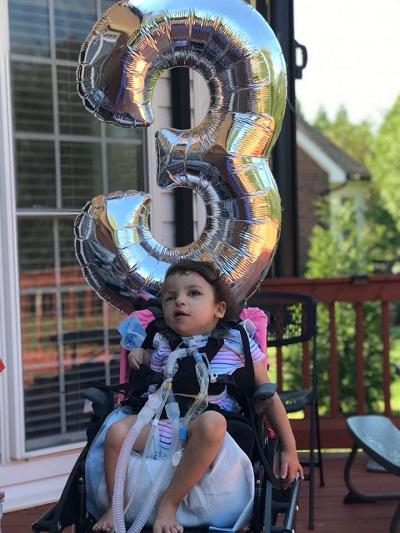
If you see her profile, it seems a lot worse on paper than when you actually meet her. Her doctors say she’s thriving, and she communicates and knows when you’re going to sing a certain song. She knows her alphabets, loves books, music, nursery rhymes, listening to Quran and loves attention. She loves any toys with music and colors as well as bubbles and farm animals.
I know you chose the name Maryam for a special reason.
Before I knew she had a rare disorder, I always loved the names Maryam and Lena and was debating between the two. After we found out the rare syndrome, I realized that whatever she has, Allah (S) chose her for it. I had to name her Maryam. In the Quran, Allah (S) chose Maryam out of all women as the most pure woman. I found it applicable to name Maryam because Allah (S) chose her to have this syndrome and made her special in that way
Where do you find strength in times of weakness and exhaustion?
As a mom of any child, we often complain about things like - oh they’re always hungry or always running around. These basic things that other moms complain about, moms with special needs kids wish they could have [the same complaints]. Something simple as hearing Maryam’s voice or seeing her walk on her own - I don’t know if I ever will. There are a lot of unknowns when you have a child with special needs, and what others see as complaints I see as huge blessings. You become more appreciative.
I find strength when I get a chance to be alone and reflect. Nature is big for me. For example, yesterday was an exhausting day with being out, so I went outside to see the sunset and did my evening athkar (morning and evening supplications). I love watching nature and the beauty of Allah’s (S) creations. I also love coffee in all its forms and making coffee drinks for my loved ones.
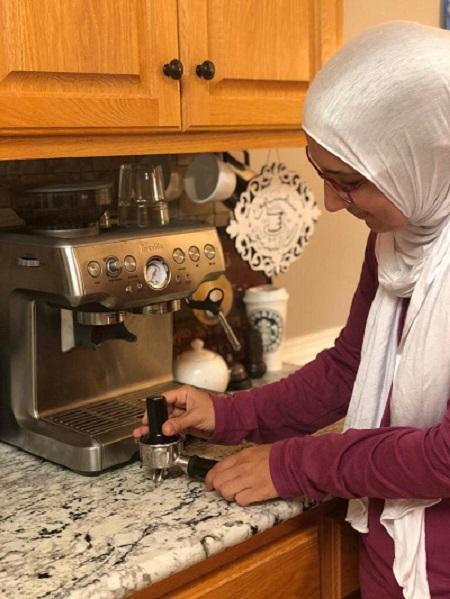
Sports are also a big thing for me. I always try to find these outlets and schedule my games at least once a week. Support groups also help a lot. I also love having deep Quranic reflections with friends and family and attending spiritual gatherings. Of course I love my coffee, and I enjoy making it for myself and for others. So, that also helps me take a mental break at home.
Mental health is so important. When Maryam is sick, we take her to the doctor. If you’re feeling down, it’s important for you to seek professional help from a therapist or find outlets that will help you mentally. If you’re trying to do the right things by surrounding yourself with the right people, finding the right outlets, doing your athkar and keeping the Quran as a companion, but it doesn’t seem enough and your head gets to you and you get burnt out - you should seek professional help.
I wouldn’t take going to therapy lightly, I would definitely pursue that if you are in a tough situation. I find that it’s a huge stigma in the Muslim community.
How have you seen yourself grow as a person since having Maryam? How have you changed as a mother, daughter and wife?
Since having Maryam I’ve tried to be more open minded in seeking help. I ask for help more, especially in terms of parenting. I accept when I need help. I also learned to be more flexible and let things go. I focus on emotions and internal happiness and what makes me happy over what society says I “should” be doing. I try not to be a perfectionist.
At the end of the day if I see Maryam and Tasneem happy and healthy, that’s more important for me than seeing the house perfectly clean and tidy.
Can you describe Tasneem and Maryam’s relationship as sisters? How has Tasneem taken on the role of “big sister”?
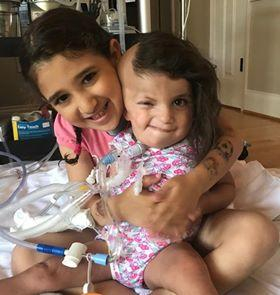
Having Maryam for Tasneem has made her a lot more kind. She notices things more, like people on wheelchairs. When she hears negative comments about her sister, she’s always the first person to get mad or defend Maryam. Tasneem loves raving about Maryam to everyone. She takes on the role to introduce her and tell them about her small right side. She loves to be her nurse and loves to be involved.
Maryam loves her, too. She loves seeing her come back from school. Tasneem knows all of Maryam’s favorite songs, so she sings to her a lot.
What are some tips you have for mothers to be/moms who are raising children with special needs?
Find your faith in Allah (S) and stick with people who help increase your faith and make connections with Allah (S). There could be two different extremes to the way you think, one where you forget your connection with Allah (S) because you’re caught up with your kids and day to day life.
The other extreme is that you’re thinking that Allah (S) gave you almost a punishment and he maybe doesn’t love you so you feel like there’s no hope in even connecting with Him. Find that middle ground where He chose you because you’re that special person.
A friend once told me that our goal is to achieve Jannah. When we have children, our hope for them is to enter Jannah. But when you have a child with special needs, they are already guaranteed Jannah, so it’s like Allah (S) is inviting you in. It’s actually an honor that you are raising an inhabitant of Jannah in your own home.
Have support. Find people who know what you need and will support you in what you need. Don’t prioritize people who don’t know how to be there for you. Be open minded in types of therapy, not just for your kid but for yourself. Find out what types of outlets are therapeutic for you: counseling, sports, a hobby. Alone time is very valuable.
To learn more about CHILD Syndrome and Samia's fundraising efforts as well as her Quranic reflections, check out the following links.
CHILD Syndrome - Team Maryam @teammaryam | Rare and Undiagnosed Network of Charlotte @RUNCharlotte | Youtube Channel: Samia Mubarak | Blog: http://myquranicreflections.blogspot.com | Instagram: @hijabirista


Subscribe to be the first to know about new product releases, styling ideas and more.
What products are you interested in?

